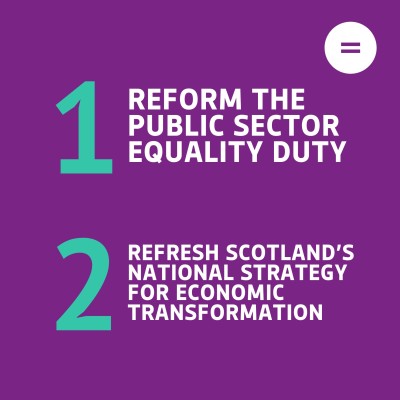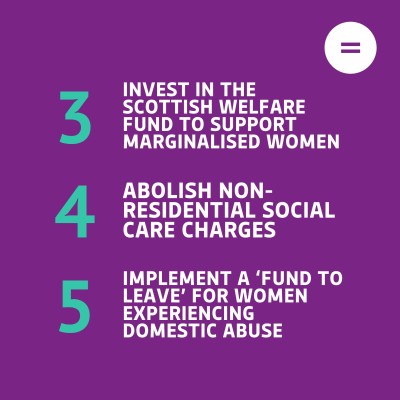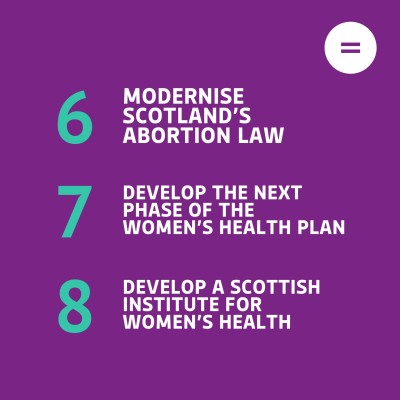Engender blog
All of Engender’s latest news. Reports, reviews, books, articles, and information from across Scotland’s women’s sector.
We would love to hear from other feminists around Scotland. Check out our guidelines for more information on how you can blog for us.
Why we need to modernise abortion law in Scotland - your questions answered
For too long women in Scotland & the UK have had to settle for a system of abortion law that doesn’t put their needs & rights first. We’re calling for modernised abortion law that works for women’s human rights & prevents further unnecessary prosecutions.
To mark International Safe Abortion Day on 28th September, we’ve got the answers to some of the most frequently asked questions about why we need to decriminalise abortion in Scotland now.
-600.png)
Wait, isn’t abortion legal in Scotland?
No. Women and pregnant people in Scotland currently do not have the legal right to make the final decision about ending a pregnancy. Instead, that power lies in the hands of doctors—two of whom must approve any request for an abortion. This adds needless complexity to the process, leading to delays and creating unnecessary barriers for those seeking care, especially for marginalised groups like disabled women, migrant women and young women.
So what is the law?
The laws that dictate when abortion is permitted in Scotland are a patchwork of outdated regulations, stemming from as far back as the 17th century. These measures largely reflect the eras in which they were introduced and the degrees of patriarchal control women were subject to at the time. To put it in perspective, one of these laws is based in legislation from when witch trials were still happening.
Why do we need decriminalisation?
The current law is disconnected from the realities of modern Scotland, where abortion is routine healthcare accessed by around one in three in their lifetimes. While most women can access services without issue, marginalised women face greater challenges due to the two-doctor approval rule. For instance, for women in rural areas, there might only be one doctor available locally, or they may have to travel long distances to a clinic where abortion services are available.
Without this authorisation, abortion remains illegal across Britain, and women, healthcare providers and people assisting someone to have an abortion can be subject to prosecution. These and other restrictions set out in the Abortion Act can impede access to reproductive healthcare in Scotland.
The sharp increase in prosecutions for abortion-related offences in England highlights how outdated laws clash with modern medical practices and commitments to public health, human rights, and gender equality. Our report explores these legal failures in Scotland, including evidence that women have been charged and prosecuted for abortion-related offences in recent years.
Would decriminalising abortion make unsafe ‘backstreet’ abortions legal?
One argument against decriminalisation claims it would ‘legalise non-medical, backstreet abortions,’ but this is misleading. The Abortion Act strictly controls when, where, and how abortions can occur. Outside of this framework, abortion remains a crime.
It’s also important to note that 99% of abortions in Scotland today are medical, induced by pills, not surgical. The unsafe ‘backstreet’ abortions that were common when the Abortion Act was enacted are simply not the threat they were in the 1960s.
Despite being one of the most common and safest healthcare procedures—accessed by one in three women - abortion is treated differently in law than almost all other medical procedures. In all other fields of healthcare, medical bodies are able to shape guidance and regulation based on best practice, rather than complex laws, including criminal law, from a bygone era.
Do people in Scotland support abortion reform?
Decriminalisation is recommended by the World Health Organization, all major UK medical bodies, UN treaty groups, trade unions, and equality advocates. While abortion is often seen as a polarising issue, especially in Scotland, the reality is much different.
Regular polling by YouGov shows that the vast majority of Scots are firmly in favour of abortion rights. In fact, as of January 2024, 93% agreed that ‘women should have the right to an abortion.’ Despite lingering stigma and uncertainty surrounding abortion, partly due to its criminalisation, social attitudes in Scotland have shifted dramatically in recent decades.
Are politicians willing to take action?
With a few high-profile exceptions, countries across the world are increasingly modernising and liberalising their legal frameworks on abortion. In contrast, the laws in Scotland, England, and Wales are falling behind more progressive approaches seen in most of Europe. Britain, including Scotland, has also not kept up with international human rights standards, which clearly state that access to safe, legal, and timely abortion is a basic human right and shouldn’t be controlled through criminal laws or punishments.
In the UK, politicians have historically avoided changing abortion laws, seeing it as a ‘controversial’ issue. As a result, decisions taken in parliament have tended to be free votes rather than along party lines. However, Northern Ireland, Scotland, and Wales have all used their devolved powers to make changes, with Northern Ireland passing laws and Scotland and Wales taking executive action. For example, Scotland has approved early medical abortion at home and updated reporting requirements. Meanwhile, support for decriminalising abortion is growing across the political spectrum in Scotland.
Would decriminalising abortion face legal challenges?
Abortion was devolved to the Scottish Parliament in 2016 and it is open to the Scottish Parliament to pass legislation that amends the Abortion Act. The UK parliament has historically avoided reforming abortion laws at Westminster.
If Scotland were to change or repeal the Abortion Act, it could face legal challenges from the UK Government, arguing that different abortion laws across the UK would cause problems. However, Northern Ireland has always had different abortion laws. At the same time, the rising number of investigations and prosecutions of women seeking abortions in England has increased calls to decriminalise abortion and repeal the Abortion Act at Westminster.
Anti-abortion groups would likely try to block progressive abortion law reform. They previously challenged Northern Ireland’s law on safe access to clinics, but the UK Supreme Court rejected that case. Similar challenges in Scotland, such as the one against early medical abortions at home, have also been unsuccessful.
Find out more and read our full report here: ‘Outdated, harmful and never in the public interest - The urgent need to modernise Scotland’s abortion law and prevent prosecutions.’
8 Steps Towards Women’s Equality in Scotland
Ahead of the next Programme for Government for 2024-25, we have outlined several important actions we want the Scottish Government to take to protect women’s rights and promote gender equality in Scotland.

Engender advocates for a Scotland where women are involved in all political and economic decisions, both as decision-makers and individuals affected by these decisions. This means recognising the diverse experiences of all women, including those facing multiple forms of discrimination, such as Black and minority ethnic women, younger and older women, disabled women, lesbian, bisexual, and trans women, women from rural areas, and those who are mothers, women who have experienced domestic abuse or men’s violence, and those experiencing poverty.
We have identified eight key actions in three main areas that need change:
 EMBED GENDER EQUALITY ACROSS ALL SCOTTISH GOVERNMENT POLICY
EMBED GENDER EQUALITY ACROSS ALL SCOTTISH GOVERNMENT POLICY
To achieve the Scottish Government’s main goals—eliminating child poverty, boosting the economy, addressing climate change, and improving public services—it’s crucial to improve how gender equality is considered across policymaking. These goals affect women and men differently, especially for women facing additional marginalisation. If policies don’t account for structural inequalities, their benefits for Scotland’s most disadvantaged people will be limited.
 ADDRESS WOMEN’S POVERTY AND FINANCIAL INEQUALITY
ADDRESS WOMEN’S POVERTY AND FINANCIAL INEQUALITY
Eliminating child poverty is the First Minister’s top priority. To succeed, the Programme for Government must connect women’s poverty with children’s poverty. There’s an urgent need to get financial support to the most vulnerable families in Scotland, and focusing on women’s economic inequality is often the most effective approach. This must include targeted actions which tackle the disproportionately negative impacts that the cost of living crisis is having on women’s lives, especially for women who experience other forms of marginalisation.
 TACKLE WOMEN’S HEALTH INEQUALITIES AND PROTECT REPRODUCTIVE RIGHTS
TACKLE WOMEN’S HEALTH INEQUALITIES AND PROTECT REPRODUCTIVE RIGHTS
Women and girls still face inequalities in health and wellbeing and access to services compared to men and boys, mainly due to gender inequality and “medical misogyny.” Marginalised women, including women of colour, disabled women, unpaid carers, LGBTI+ women, younger and older women, and migrant women, experience even wider disparities in health outcomes. We urgently need updated abortion laws that uphold women’s rights and action to advance Scotland’s Women’s Health Plan.
Read more about all our asks here.
Join our team: Project Manager, Equal Media & Culture Centre for Scotland
Closing date: August 19, 2024
Anticipated week of interview: Thursday the 29th of August.
We are delighted to be seeking a Project Manager for Engender's Equal Media and Culture Centre for Scotland! Apply here.
The Role
This role will manage the 'Equal Media and Culture Centre Scotland', an initiative that focusses on securing intersectional gender equality in Scotland’s media and cultural landscape. The Centre works to increase accountability around equality within media and cultural institutions through a programme of research development, awareness raising, advocacy, partnership-working, and shared learning.
This project delivers on a recommendation from the First Minister's National Advisory Council for Women and Girls.
Benefits
- Competitive salary £35,569.09 (funding is secured until 31st March 2025 with the expectation of continued funding)
- 39 days annual leave, including bank holidays (36 days pro rata during 4-day week trial)
- Auto-enrolment into Engender’s pension scheme with 8% employer contribution
- Flexible working opportunities and access to services and resources to support your wellbeing
Find all the details and apply here.
General Election 2024 - The Rwanda Scheme & Safety of Women – Joint Blog with Amina MWRC
[Content Note: abuse, sexual assault]
In this joint blog, women’s rights experts from Amina MWRC and Engender come together to discuss the safety of women in light of the Rwanda Act.
We are calling on candidates in the upcoming General Election to commit to taking action on four key areas for women if elected. In our What’s in it for women? four-part series, we’ll break down each of our key asks covering health, social security, equal representation and immigration.
Find and email your local candidates with our pre-written letter here.
.png)
General Election 2024 - Reforming social security to fight women's poverty
We’re calling on candidates in the upcoming General Election to commit to taking action on four key areas for women if elected.
In our What’s in it for women? four-part series, we’ll break down each of our key asks covering health, social security, equal representation and immigration.
Today, we’ll focus on social security and why we need reform of household payments of Universal Credit and removal of the two-child limit to fight women’s poverty.
Find and email your local candidates with our pre-written letter here.

Downloads
 Engender Briefing: Pension Credit Entitlement Changes
From 15 May 2019, new changes will be introduced which will require couples where one partner has reached state pension age and one has not (‘mixed age couples’) to claim universal credit (UC) instead of Pension Credit.
Engender Briefing: Pension Credit Entitlement Changes
From 15 May 2019, new changes will be introduced which will require couples where one partner has reached state pension age and one has not (‘mixed age couples’) to claim universal credit (UC) instead of Pension Credit.
 Engender Parliamentary Briefing: Condemnation of Misogyny, Racism, Harassment and Sexism
Engender welcomes this Scottish Parliament Debate on Condemnation of Misogyny, Racism, Harassment and Sexism and the opportunity to raise awareness of the ways in which women in Scotland’s inequality contributes to gender-based violence.
Engender Parliamentary Briefing: Condemnation of Misogyny, Racism, Harassment and Sexism
Engender welcomes this Scottish Parliament Debate on Condemnation of Misogyny, Racism, Harassment and Sexism and the opportunity to raise awareness of the ways in which women in Scotland’s inequality contributes to gender-based violence.
 Gender Matters in Social Security: Individual Payments of Universal Credit
A paper calling on the Scottish Government to automatically split payments of Universal Credit between couples, once this power is devolved to the Scottish Parliament.
Gender Matters in Social Security: Individual Payments of Universal Credit
A paper calling on the Scottish Government to automatically split payments of Universal Credit between couples, once this power is devolved to the Scottish Parliament.
 Gender Matters Manifesto: Twenty for 2016
This manifesto sets out measures that, with political will, can be taken over the next parliamentary term in pursuit of these goals.
Gender Matters Manifesto: Twenty for 2016
This manifesto sets out measures that, with political will, can be taken over the next parliamentary term in pursuit of these goals.
 Scottish NGO Briefing for UN Special Rapporteur on Violence Against Women
Joint briefing paper for the UN Rapporteur on Violence Against Women.
Scottish NGO Briefing for UN Special Rapporteur on Violence Against Women
Joint briefing paper for the UN Rapporteur on Violence Against Women.

Newsletter
Sign up to receive our newsletter here:
Sign up to our mailing list
Receive key feminist updates direct to your inbox: